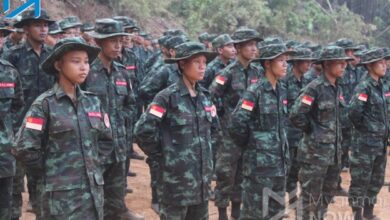
Companies from more than a dozen countries have been implicated in Myanmar’s “robust” arms manufacturing industry, according to a report released by the Special Advisory Council for Myanmar (SAC-M) on Monday.
SAC-M—which was formed in the wake of the February 2021 coup by a group of independent international experts—named institutions based in Austria, China, France, Germany, India, Israel, Japan, Russia, Singapore, South Korea, Taiwan, Ukraine and the US as “providing supplies that are critical to weapon production” by the Myanmar military.
Titled “Fatal Business,” Monday’s report outlined how a range of arms have been made in up to 25 shadowy domestic manufacturing facilities run by the military’s Directorate of Defence Industries, known locally by its Burmese acronym of Ka Pa Sa.
The resulting weapons have been widely used against civilians in the violent post-coup crackdown on dissent, as well as in prior Myanmar army offensives, particularly against ethnic populations.
“The Myanmar military has built a robust arms manufacturing industry that makes it largely self-sufficient in its ability to produce the small arms, light weapons and ammunition it uses to brutally suppress the Myanmar people,” one of the group’s independent experts, Marzuki Darusman, said in a statement. He emphasised, however, that a “reliance on external supplies” remains an indication that the institution is “still vulnerable to external pressure.”

The army’s production processes depend on imports for various weapons components, machinery, advanced technology, and some raw materials.
From China, and increasingly India, the military has purchased “fuses, cast boosters, detonating caps, igniters and electric detonators” which are then assembled in Ka Pa Sa factories, according to the report. It identifies multiple arms transfers by Indian entities since the February 2021 coup, including those affiliated with the country’s defence ministry.
Singapore-based businesses are described as brokering export deals for the military or with affiliated crony companies, serving as a “strategic transit point” for production supplies, including raw materials. Two companies registered in Singapore, Excellence Metal Casting Pte. Ltd and STE Global Trading Pte. Ltd.—owned by Myanmar national and “key player” in the industry Tun Hlaing—were identified as importing “raw materials of an unknown nature.”
Chinese state-owned arms manufacturer NORINCO was named as “playing an instrumental role in providing a variety of critical supplies” for weapons production, including iron, aluminium, copper and brass shipped to Myanmar through Singapore, SAC-M stated.
Functioning as the intermediary between NORINCO and the Myanmar military’s Directorate of Defence Industries was Yan Hoe, chair of major local conglomerate Mottama Holdings Ltd., according to SAC-M. The group pointed out that the company was sanctioned by the US some 10 years ago—when it was known as Asia Metal Company—for its role in supplying construction materials to a military factory.
Machines or machine parts built by foreign companies—including multiple German entities, Japan’s Tsugami Corporation, Austria’s GFM Steyr, and the American HAAS Automation—were allegedly in use in Myanmar military factories at the time of reporting.


Some eight Taiwanese companies were identified by SAC-M as providing these factories with computer-controlled carving machines often used to cut steel for firearms, including those manufactured by GFM Steyr.
Citing ex-military sources, Monday’s report outlined how the domestic Mottama Holdings routinely facilitated the shipping of these machines to Taiwan for maintenance by the Austrian company’s technicians. SAC-M noted that it was “not known” if GFM Steyr was “aware of the end-use of the machines” in Myanmar when servicing them overseas.
French, German and Israeli software required to operate such machinery was allegedly also found to be in use in Myanmar military weapons factories.
SAC-M called on foreign governments to investigate the companies identified through their research to determine whether the use of their products and technology in Myanmar violated export controls or human rights responsibilities, pointing out that such businesses could be “complicit in […] atrocities committed by the Myanmar military.”
The countries in question were urged to take necessary action to halt and prevent such engagement, with SAC-M warning that these states may be failing to uphold their obligations under international rights statutes and humanitarian law.
“UN member states should do everything in their power to restrict the Myanmar military’s access to those supplies to protect the Myanmar people, including by adopting targeted sanctions against the Ka Pa Sa, its leadership and its network of brokers,” SAC-M’s Marzuki Darusman said.


![Resistance fighters holding heavy weapons ammunition in central Myanmar. (Photo: Freedom Revolution Force [FRF])](https://myanmar-now.org/en/wp-content/uploads/sites/5/2024/04/438869056_443267851680128_1706386881626943924_n-390x220.jpeg)
